At the 2019 NPC & CPPCC Exchange and Sharing Meeting, Ma Fung-kwok, Head of Hong Kong’s delegation of NPC deputies, and several CGCC members who serve as NPC deputies and CPPCC National Committee members jointly discussed the key guiding principles and policy directions of this year’s “Two Sessions”, as well as the implications and opportunities for Hong Kong’s development.
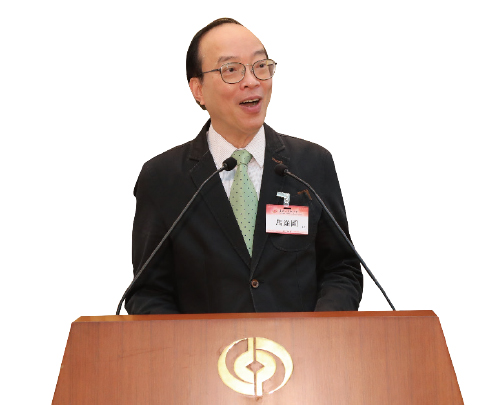
Ma Fung-kwok: Fully confident in the country’s future
In his keynote address, Ma Fung-kwok, NPC Deputy, said that Premier Li Keqiang’s Government Work Report this year, which reviewed the country’s achievements and issues in its development last year and gave guidance to its future tasks and development directions, received unanimous and enthusiastic applause 58 times. He noted that the Premier’s report gave people full confidence in the country’s long-term development amid external economic uncertainties. In the past 40 years of reform and opening-up, the economy has grown 240-fold, and with industries in the up-, mid- and down-streams well aligned and infrastructure developing rapidly, the people’s sense of happiness and gain in life has significantly strengthened.
Looking ahead, Ma believes that China has an irreplaceable role to play not only in solving various global problems, but also in promoting the development of major technological fields and markets. The country’s urbanization and infrastructure development, improvements in industrial systems and innovation capabilities, focus on agriculture and environmental protection, as well as implementation of the “Belt and Road Initiative” bring new opportunities for its sustainable development and participation in the transformation of the global economic governance system. From this year’s “Two Sessions”, he deeply realized the Central Government’s awareness and confidence in promoting the country’s development and shouldering of increased responsibility to further drive clean and better government in order to build a good life for the people.
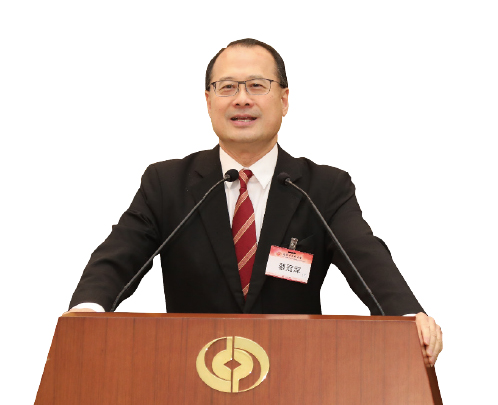
Jonathan Choi: Helping businesses embrace new opportunities
Jonathan Choi, the Chamber’s Chairman and CPPCC National Standing Committee Member, pointed out that it had not been easy for China’s economy to maintain a 6.6% growth rate last year amid the rise of international trade protectionism. China’s introduction of massive tax cuts of RMB 2 trillion, increased support for private SMEs and adoption of the Foreign Investment Law demonstrate its unwavering commitment to reform and opening-up. Its growing economic strength not only provides more growth drivers for Hong Kong and the Mainland, but also brings tremendous new business opportunities for industrial and commercial enterprises.
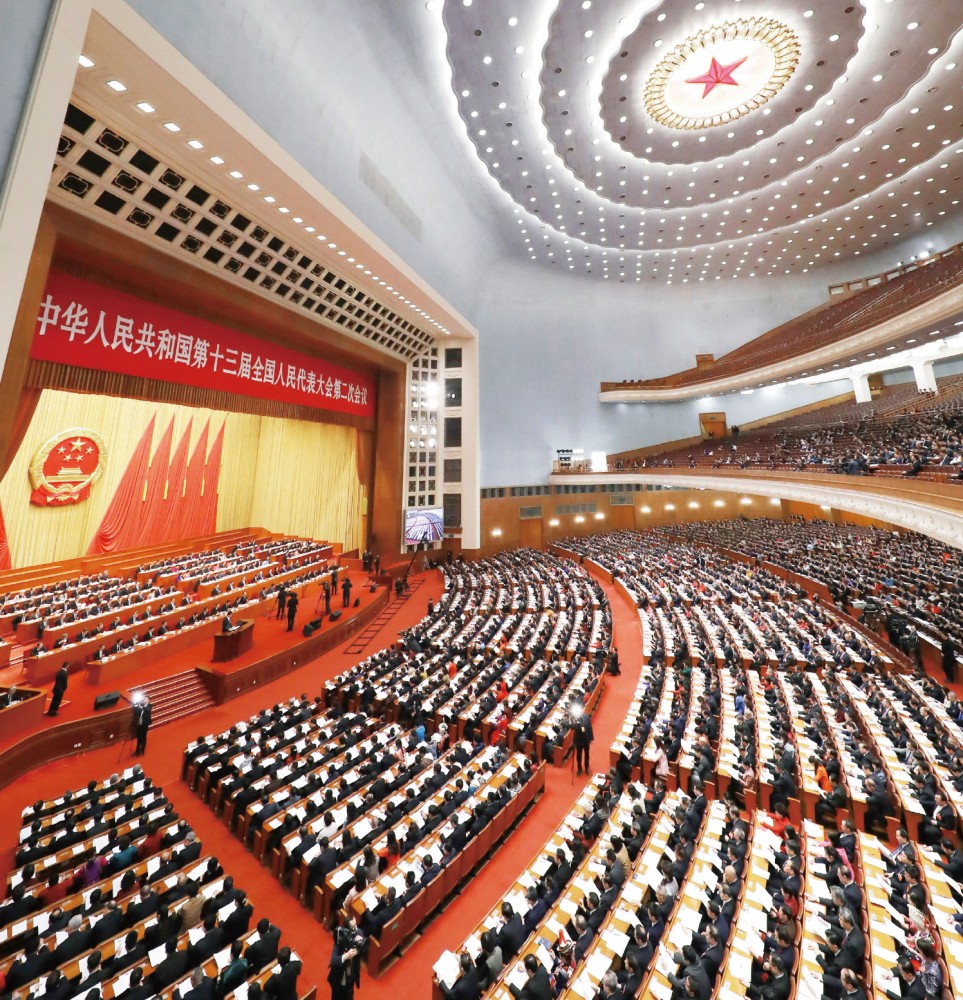 Choi added that the Guangdong-Hong Kong-Macao Greater Bay Area (Greater Bay Area) was the focal point of this year’s “Two Sessions”. The Outline Development Plan for the Greater Bay Area sets out five areas of strategic positioning for the Greater Bay Area. The Central Government also gives Hong Kong the status as the “central node” of the Greater Bay Area’s four core cities, reflecting the importance and trust the country has placed in Hong Kong. The Central Government has rolled out eight facilitation measures for the Greater Bay Area and also announced that it will introduce 30 measures to facilitate the flow of people, goods and funds in the area. It can be expected that the country will promote the implementation of the development plan for the Greater Bay Area at full speed this year. He looks forward to the Greater Bay Area implementing true interconnection of living elements and deepening support services such as innovative systems and mechanisms and those for the convenience and benefit of the people in order to form a common living circle in the Greater Bay Area.
Choi added that the Guangdong-Hong Kong-Macao Greater Bay Area (Greater Bay Area) was the focal point of this year’s “Two Sessions”. The Outline Development Plan for the Greater Bay Area sets out five areas of strategic positioning for the Greater Bay Area. The Central Government also gives Hong Kong the status as the “central node” of the Greater Bay Area’s four core cities, reflecting the importance and trust the country has placed in Hong Kong. The Central Government has rolled out eight facilitation measures for the Greater Bay Area and also announced that it will introduce 30 measures to facilitate the flow of people, goods and funds in the area. It can be expected that the country will promote the implementation of the development plan for the Greater Bay Area at full speed this year. He looks forward to the Greater Bay Area implementing true interconnection of living elements and deepening support services such as innovative systems and mechanisms and those for the convenience and benefit of the people in order to form a common living circle in the Greater Bay Area.
Choi also mentioned the CPPCC’s function of “developing political awareness and paying attention to the overall situation” to exert positive energy, playing a leading role to achieve social consensus. He said that the CPPCC members will continue to rigorously and conscientiously perform their duties in order to actively engage in promoting national development with an innovative mindset.
Ricky Tsang: Support young people to tap Greater Bay Area opportunities
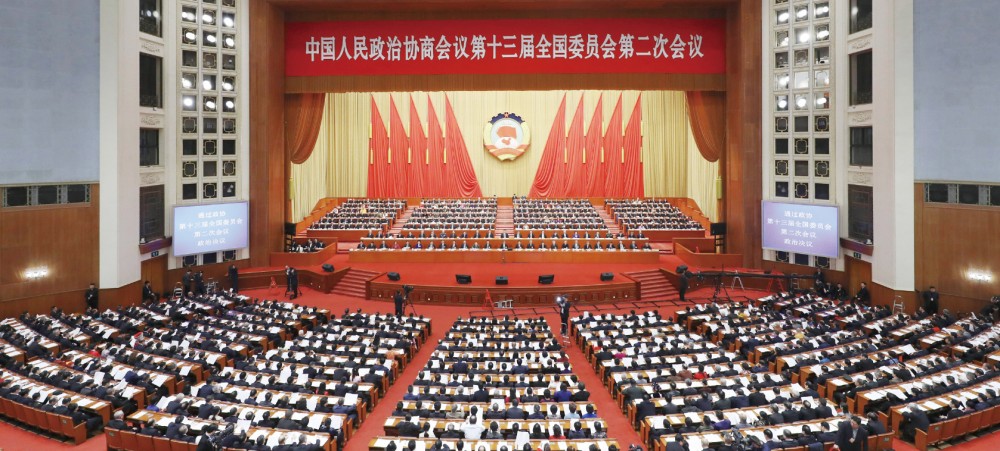 This year’s Government Work Report announced a 3% tax cut. Ricky Tsang, the Chamber’s Vice-chairman and CPPCC National Committee Member, said that as the country grows richer and stronger, the Central Government wants to return wealth to the people to give them a sense of happiness and gain. The announcement was met with thunderous applause. In his view, although the HKSAR Government’s revenues are not as much as the Central Government’s, it should also introduce tax concession measures to give the public the same sense of happiness and gain.
This year’s Government Work Report announced a 3% tax cut. Ricky Tsang, the Chamber’s Vice-chairman and CPPCC National Committee Member, said that as the country grows richer and stronger, the Central Government wants to return wealth to the people to give them a sense of happiness and gain. The announcement was met with thunderous applause. In his view, although the HKSAR Government’s revenues are not as much as the Central Government’s, it should also introduce tax concession measures to give the public the same sense of happiness and gain.
Tsang and his think thank have been promoting the Greater Bay Area in recent years. He noted that the public now has a deeper understanding of the Greater Bay Area, but those who are interested in going to the Greater Bay Area for development have no way of doing so. Tsang has earlier driven the establishment of www.youth-bay.com to provide updates on the Greater Bay Area. In view of the expensive fees charged by the infrastructure and transportation networks connecting the Greater Bay Area, he suggested the governments of Guangdong and Hong Kong consider providing upfront subsidies to young people going to the Mainland to start businesses in order to attract more of them to tap the opportunities in the Greater Bay Area.
Tommy Li: Mainland officials conscientious and responsible
Tommy Li, the Chamber’s Vice-chairman and NPC Deputy, was deeply impressed by the Mainland government officials’ meticulous handling of and quick responses to the deputies’ suggestions at this year’s “Two Sessions”. Citing the traditional chinese medicine industry where he operates in as an example, he said that the officials responded to him just one day after he made a suggestion on publicizing the theory of “preventive treatment of disease”. He therefore feels that Hong Kong and Macao deputies are by no means “rubber stamps”. Instead, Mainland government officials will seriously study their proposals.
As for the Foreign Investment Law, as it does not change the relevant legal applications for investments from Hong Kong, Macao and Taiwan, Li deeply feels that the country attaches great importance to these three places. He also said that the work reports of the Supreme People’s Court (SPC) and the Supreme People’s Procuratorate (SPP) show the high level of efficiency with which cases were handled at the national level as well as the country’s outstanding performance in the fight against corruption.
Herman Hu: Cope with complex times with steadiness
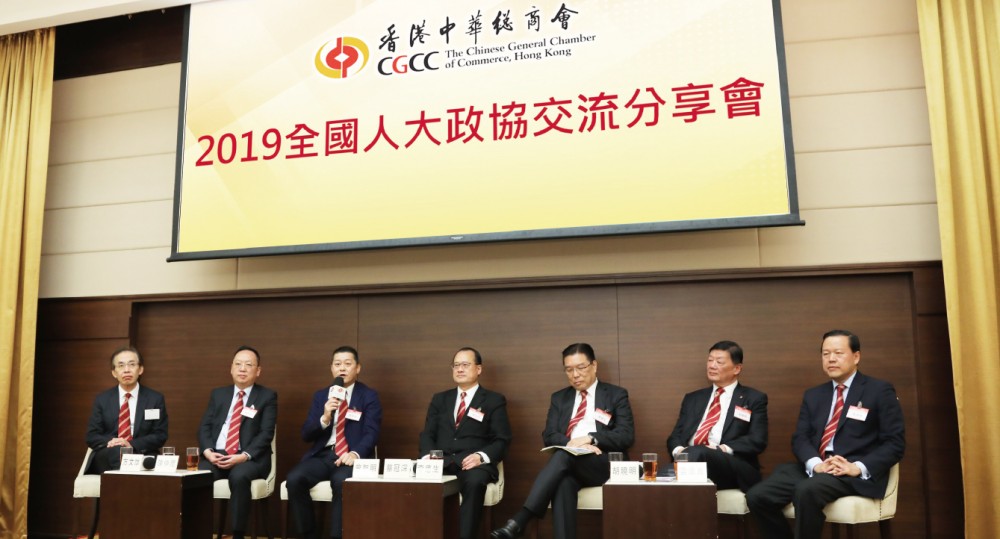 In view of the complex situations at home and abroad, Herman Hu, the Chamber’s Vice-chairman and NPC Deputy, believes that Premier Li’s report this year has focused on “steadiness”, in which “steady growth” is the main policy focus. At the same time, President Xi Jinping pointed out that the government should comprehensively promote reform, restructuring, livelihood improvement and risk prevention. Hence, Hu believes that everyone must have the “four aspects of confidence” put forward by President Xi to progress with the country in its path, theory, system and culture.
In view of the complex situations at home and abroad, Herman Hu, the Chamber’s Vice-chairman and NPC Deputy, believes that Premier Li’s report this year has focused on “steadiness”, in which “steady growth” is the main policy focus. At the same time, President Xi Jinping pointed out that the government should comprehensively promote reform, restructuring, livelihood improvement and risk prevention. Hence, Hu believes that everyone must have the “four aspects of confidence” put forward by President Xi to progress with the country in its path, theory, system and culture.
Referring to the work reports of the SPC and the SPP, Hu gave high praises for their thoroughness and illustrations. Moreover, in recent years, the country has advocated the use of high-tech to encourage the public to understand more about their legal rights, including “circuit courts” and “smart courts”, which fully demonstrates the country’s great progress in the rule of law.
Rock Chen: Quality over quantity of advice to government
Rock Chen, the Chamber’s Vice-chairman and CPPCC National Committee Member, shared how to perform CPPCC’s duties in giving suggestions to the government. In his view, the CPPCC is a think tank of talents and touches on a wide range of social issues. Therefore, it is necessary to have full knowledge and mastery of the relevant issues before giving suggestions to the government. Chen said that surveys and research are the most important way to understand an issue. Besides obtaining information from text and the Internet, one must also personally learn about the issue from all stakeholders and relevant parties to know exactly where the issue lies so as to propose appropriate solutions. He believes this is in line with the spirit of this year’s CPPCC conference of focusing on quality over quantity.
Chen believes that the development plan for the Greater Bay Area, which was unveiled earlier, presents huge opportunities for the business community. Taking financial development as an example, many financing projects in the Greater Bay Area will be carried out through Hong Kong. Another example is that the Science and Technology Innovation Corridor developed by Hong Kong with Guangzhou, Shenzhen and Macao will have great potential for Hong Kong’s young people interested in engaging in the I&T industry.
David Fong: Approval simplification helps business development
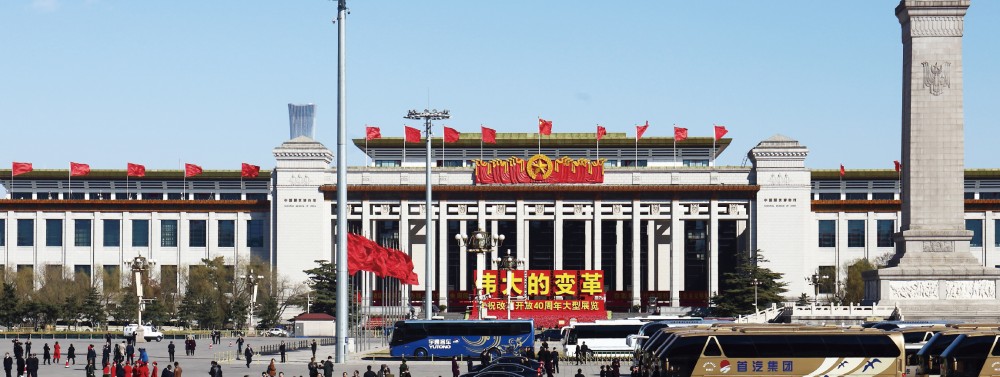 David Fong, the Chamber’s Life Honorary Chairman and CPPCC National Committee Member, pointed out that amid the uncertainties of China-US trade frictions and complex regional relations, Premier Li stated clearly that downward pressure on the Mainland’s economy has increased and the top priority is to be steady. This reflects the shift in the country’s economic development from the pursuit of “quantity” to focus on “quality”. Premier Li also said that if the market can manage it, the government will leave it to the market. The government will not intervene unnecessarily. Even if it is necessary, the procedures should be streamlined to provide an ideal and convenient business environment for enterprises. Fong applauded this as a major breakthrough, which could reduce various approvals and procedures so that enterprises can focus more on business development.
David Fong, the Chamber’s Life Honorary Chairman and CPPCC National Committee Member, pointed out that amid the uncertainties of China-US trade frictions and complex regional relations, Premier Li stated clearly that downward pressure on the Mainland’s economy has increased and the top priority is to be steady. This reflects the shift in the country’s economic development from the pursuit of “quantity” to focus on “quality”. Premier Li also said that if the market can manage it, the government will leave it to the market. The government will not intervene unnecessarily. Even if it is necessary, the procedures should be streamlined to provide an ideal and convenient business environment for enterprises. Fong applauded this as a major breakthrough, which could reduce various approvals and procedures so that enterprises can focus more on business development.
Along with the flourishing of innovative entrepreneurship, an average of 18,000 start-ups are being established in the Mainland every day. Fong believes it is unlikely that all of the start-ups can be successful, but he is convinced that some of them will make it big, especially in technology, health care and improvement of people’s quality. These could create new projects that the country’s economy can be proud of.
Lui Tim-leung: Resolutely punish offenders to resolve enforcement difficulty
Lui Tim-leung, the Chamber’s Committee Member and NPC Deputy, who is in his 12th year of appointment as an NPC Deputy, recalled that the work reports of the SPC and the SPP in his early years of attending the “Two Sessions” did not receive as many favourable votes as today. This year, the work reports of the SPC and the SPP were passed with a high number of votes, reflecting a marked greater recognition among participants of the country’s rule of law today.
In Lui’s view, inability to enforce the courts’ authoritative ruling and failure to pay the agreed compensation, which is also known as “enforcement difficulty”, is one of the issues that the country must resolve. In this regard, the country has adopted a series of measures, such as blanket restrictions on exit and joint restrictions with banks on loans of persons subject to enforcement, to forcing the public to comply with court decisions, which is a major step forward in the country’s rule of law. He also pointed out that in recent years, the country has put a lot of efforts in public interest litigation to further safeguard people’s livelihood such as in the areas of food and drug safety, which is worthy of recognition. He looks forward to the NPC deputies continuing to perform their duties in monitoring the implementation of the reports and safeguarding social justice and the rule of law in the future.




